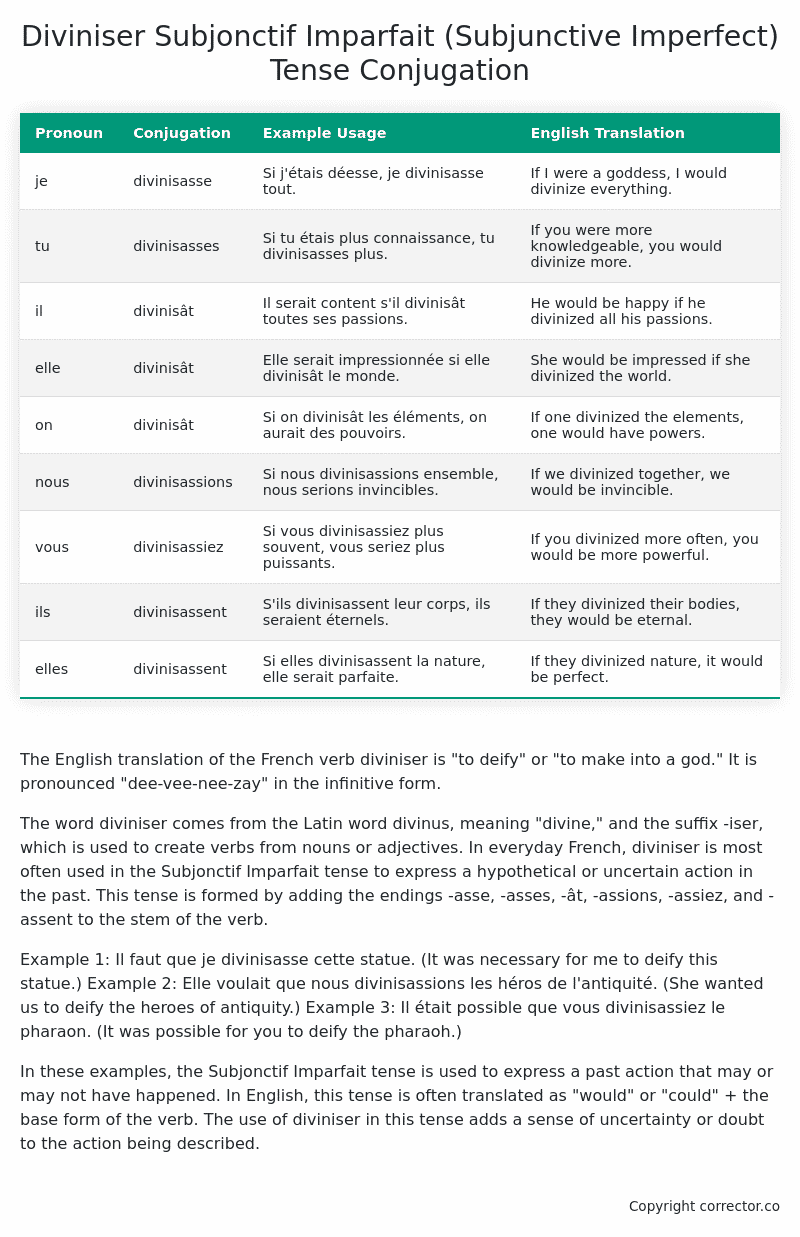Subjonctif Imparfait (Subjunctive Imperfect) Tense Conjugation of the French Verb diviniser
Introduction to the verb diviniser
The English translation of the French verb diviniser is “to deify” or “to make into a god.” It is pronounced “dee-vee-nee-zay” in the infinitive form.
The word diviniser comes from the Latin word divinus, meaning “divine,” and the suffix -iser, which is used to create verbs from nouns or adjectives. In everyday French, diviniser is most often used in the Subjonctif Imparfait tense to express a hypothetical or uncertain action in the past. This tense is formed by adding the endings -asse, -asses, -ât, -assions, -assiez, and -assent to the stem of the verb.
Example 1: Il faut que je divinisasse cette statue. (It was necessary for me to deify this statue.)
Example 2: Elle voulait que nous divinisassions les héros de l’antiquité. (She wanted us to deify the heroes of antiquity.)
Example 3: Il était possible que vous divinisassiez le pharaon. (It was possible for you to deify the pharaoh.)
In these examples, the Subjonctif Imparfait tense is used to express a past action that may or may not have happened. In English, this tense is often translated as “would” or “could” + the base form of the verb. The use of diviniser in this tense adds a sense of uncertainty or doubt to the action being described.
Table of the Subjonctif Imparfait (Subjunctive Imperfect) Tense Conjugation of diviniser
| Pronoun | Conjugation | Example Usage | English Translation |
|---|---|---|---|
| je | divinisasse | Si j’étais déesse, je divinisasse tout. | If I were a goddess, I would divinize everything. |
| tu | divinisasses | Si tu étais plus connaissance, tu divinisasses plus. | If you were more knowledgeable, you would divinize more. |
| il | divinisât | Il serait content s’il divinisât toutes ses passions. | He would be happy if he divinized all his passions. |
| elle | divinisât | Elle serait impressionnée si elle divinisât le monde. | She would be impressed if she divinized the world. |
| on | divinisât | Si on divinisât les éléments, on aurait des pouvoirs. | If one divinized the elements, one would have powers. |
| nous | divinisassions | Si nous divinisassions ensemble, nous serions invincibles. | If we divinized together, we would be invincible. |
| vous | divinisassiez | Si vous divinisassiez plus souvent, vous seriez plus puissants. | If you divinized more often, you would be more powerful. |
| ils | divinisassent | S’ils divinisassent leur corps, ils seraient éternels. | If they divinized their bodies, they would be eternal. |
| elles | divinisassent | Si elles divinisassent la nature, elle serait parfaite. | If they divinized nature, it would be perfect. |
Other Conjugations for Diviniser.
Le Present (Present Tense) Conjugation of the French Verb diviniser
Imparfait (Imperfect) Tense Conjugation of the French Verb diviniser
Passé Simple (Simple Past) Tense Conjugation of the French Verb diviniser
Passé Composé (Present Perfect) Tense Conjugation of the French Verb diviniser
Futur Simple (Simple Future) Tense Conjugation of the French Verb diviniser
Futur Proche (Near Future) Tense Conjugation of the French Verb diviniser
Plus-que-parfait (Pluperfect) Tense Conjugation of the French Verb diviniser
Passé Antérieur (Past Anterior) Tense Conjugation of the French Verb diviniser
Futur Antérieur (Future Anterior) Tense Conjugation of the French Verb diviniser
Subjonctif Présent (Subjunctive Present) Tense Conjugation of the French Verb diviniser
Subjonctif Passé (Subjunctive Past) Tense Conjugation of the French Verb diviniser
Subjonctif Imparfait (Subjunctive Imperfect) Tense Conjugation of the French Verb diviniser (this article)
Subjonctif Plus-que-parfait (Subjunctive Pluperfect) Tense Conjugation of the French Verb diviniser
Conditionnel Présent (Conditional Present) Tense Conjugation of the French Verb diviniser
Conditionnel Passé (Conditional Past) Tense Conjugation of the French Verb diviniser
L’impératif Présent (Imperative Present) Tense Conjugation of the French Verb diviniser
L’infinitif Présent (Infinitive Present) Tense Conjugation of the French Verb diviniser
Struggling with French verbs or the language in general? Why not use our free French Grammar Checker – no registration required!
Get a FREE Download Study Sheet of this Conjugation 🔥
Simply right click the image below, click “save image” and get your free reference for the diviniser Subjonctif Imparfait tense conjugation!

Diviniser – About the French Subjonctif Imparfait (Subjunctive Imperfect) Tense
Formation
Common Everyday Usage Patterns
Interactions with Other Tenses
Subjonctif Présent
Indicatif Passé Composé
Conditional
Conditional Perfect
Summary
I hope you enjoyed this article on the verb diviniser. Still in a learning mood? Check out another TOTALLY random French verb conjugation!


